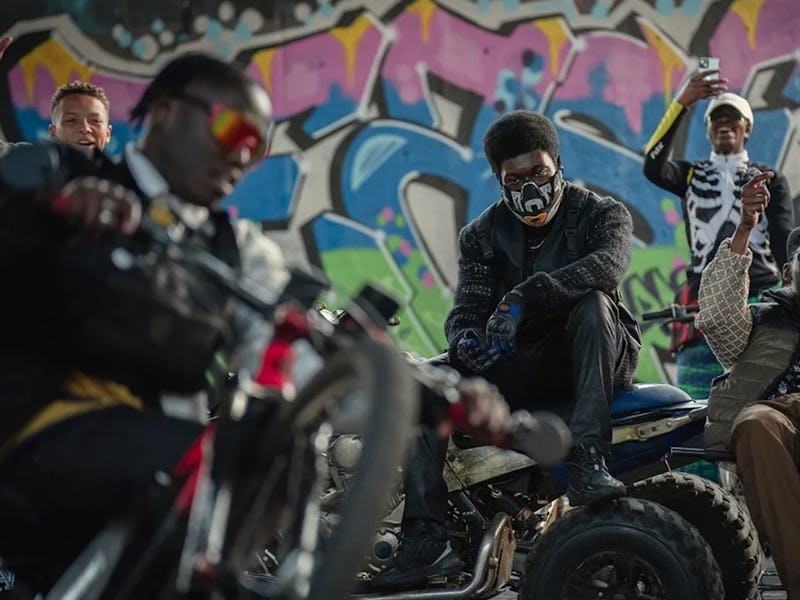Netflix Just Quietly Released the Best Sci-Fi Dystopia of the Year
The Kitchen buries an intimate communal drama in the heart of a futurist dystopia.

Netflix has a habit of acquiring promising titles, only to dump them into its catalog without so much as a whiff of promotion. That’s become a bigger problem as the streamer grows steadily larger, but of all Netflix’s recent acquisitions, few are more deserving of a platform than a dystopian thriller by the name of The Kitchen.
The film is something of a big deal, despite its unheralded Netflix premiere. The Kitchen marks Daniel Kaluuya’s (Nope, Judas and the Black Messiah) directorial debut, alongside short film director Kibwe Tavares. Kaluuya also co-wrote the film with Gangs of London’s Joe Murtagh, cementing a vision of dystopian, near-future London alongside an unconventional tale of found family. It’s Blokamp-esque in design, but is centered on Britain’s Black diaspora. It’s a shame such a unique film can’t be seen on the biggest screen possible, but it at least deserves to be seen by as many eyes as possible.
The Kitchen is a powder keg ready to explode. A housing project on London’s South Bank, the domain is one of the last bastions of resistance to the gentrification that’s chewed up the city from the inside and spat out a sprawling, cubist monstrosity. There’s no telling where one building ends and another begins. But pockets of authentic culture, of life, persist — and reluctant hero Izi (Top Boy’s Kane Robinson, also known as the rapper Kano) finds himself at the center of it all.
Izi was born in the Kitchen, but he’ll be damned if he spends another day in the projects. Thanks to a gig at an environmentalist funeral home, he’s saved up just enough to get an apartment in a nicer part of town. He’s got 21 days to secure the rest of his funds and escape, but things get complicated when he encounters the newly orphaned Benji (Jedaiah Bannerman).
Izi knew Benji’s late mother, one of the few Kitchen natives to secure upgraded housing elsewhere, and Benji insists his deadbeat dad is still hanging around the housing project. Could it be Izi? Benji certainly seems to think so, and that hope sparks an unlikely bond amid a crumbling fortress.
As Benji grows accustomed to life in the Kitchen, its underground dance halls and pirate radio sessions become part of a promising new life. The Kitchen isn’t exactly paradise — it has its own criminal empire, and is subject to unpredictable power outages and police raids. But it’s also the only community Benji’s ever known. The lure of the neon lights is seductive, and he feels at home with a tight-knit group of lost boys.
Izi does what he can to shield his new charge from the Kitchen’s dark side, all while keeping Benji at arm’s length. But lone wolf and cub will inevitably find themselves banding together against the forces that want to tear the Kitchen apart.
The Kitchen is set in a near-future dystopia, but its central bond is the heart of the film.
Kaluuya and Tavares’ directorial debut is light on action and high-concept thrills. The Kitchen’s tech-y dystopia is shot with an understated eye, focusing less on artificial intelligence than on housing inequality and mounting state surveillance. Systemic injustice is only strengthened by advancing technology and oppressive infrastructure. This is not a future with laser swords or hoverboards, and the marginalized have no tools to fight back against the tech that does exist. As the state withholds resources and cracks down on the vulnerable, the citizens of the Kitchen are forced to rely on each other, even in the face of annihilation.
In certain corners of the world, this is already the reality. “Every city has its Kitchen,” the film’s marketing reminds us, and Kaluuya and Tavares don’t let us forget that for a moment. Police raids are staged with bleak, matter-of-fact brutality; Izi’s encounters with accommodating AI are charged with familiar microaggressions. It makes the intimate moments between Izi and Benji all the more vital, and their communal resilience all the more impressive.
The Kitchen is a subtle, speculative exercise, and it’s a fitting complement to recent Black-led futurist stories like They Cloned Tyrone. Whether Izi and Benji can escape the cycle of bloodshed is the most important question for Kaluuya, Tavares, and Murtagh. Though they’re using a futurist conceit to tell this slow burn of a story, it never gets in the way of the heart-tugging dynamic at its center.
The Kitchen is streaming on Netflix.
This article was originally published on